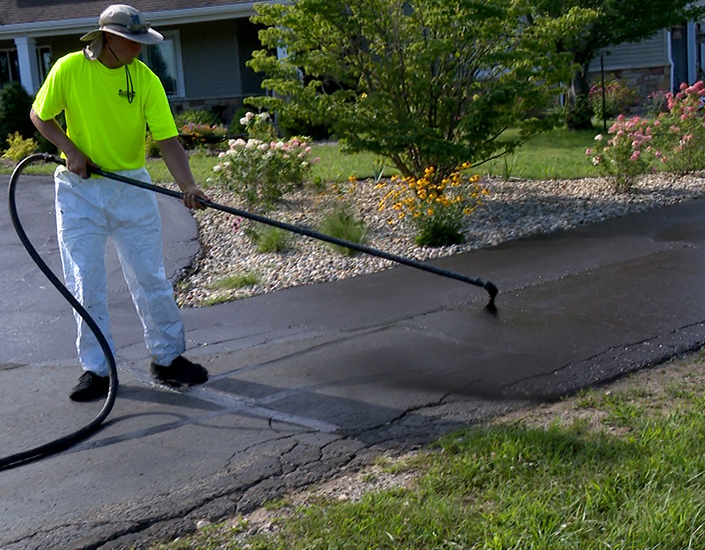Open the Secrets of Asphalt Sealing: Taking Full Advantage Of Hot Mix Asphalt Longevity
Open the Secrets of Asphalt Sealing: Taking Full Advantage Of Hot Mix Asphalt Longevity
Blog Article
Hot Mix Asphalt: A Sustainable Remedy for Pavement
Hot Mix Asphalt (HMA) has emerged as a leading sustainable selection for pavement remedies, offering a myriad of innovative technologies and environmental advantages. As the need for eco-friendly construction practices grows, exploring the subtleties of HMA's sustainability can give useful insights right into the future of pavement services.
Environmental Benefits of Hot Mix Asphalt

In Addition, Hot Mix Asphalt aids to minimize urban warm island results. Its dark shade absorbs sunshine, lowering the amount of warm reflected back into the atmosphere contrasted to lighter-colored pavements. This can reduce ambient temperature levels in metropolitan areas, lowering the demand for a/c and inevitably lowering power intake.
Additionally, Warm Mix Asphalt adds to improved stormwater administration. Its permeable nature allows water to penetrate the pavement and charge groundwater supplies, reducing runoff and the danger of flooding. These ecological advantages make Warm Mix Asphalt a lasting choice for paving roadways and highways.
Power Performance in HMA Production
Is energy performance an important consider the production of Warm Mix Asphalt (HMA)? Absolutely. Power plays a substantial duty in the production of HMA, influencing both price and ecological sustainability. One key element of power performance in HMA manufacturing is making use of cozy mix asphalt (WMA) modern technologies (regrading). WMA enables for the blending and positioning of asphalt at lower temperatures contrasted to standard warm mix asphalt, leading to lowered power consumption during production. This process not just decreases fuel use however additionally lowers greenhouse gas discharges, making it an extra eco-friendly option.
Furthermore, improvements in plant technologies have actually led to even more energy-efficient HMA manufacturing processes. By optimizing energy use in HMA production, the market can reduce its carbon impact while maintaining premium pavement products.
Recyclability of Warm Mix Asphalt
The recyclability of Warm Mix Asphalt (HMA) is a crucial element of its sustainability and long-term environmental effect. HMA is just one of the most recycled materials in the United States, with over 100 million loads of redeemed asphalt pavement (RAP) being recycled annually in new sidewalk building. Reusing HMA supplies a number of environmental advantages, such as lowering the requirement for virgin materials, lowering energy intake throughout manufacturing, and reducing the quantity of waste sent out to landfills.
The process of recycling HMA involves crushing the existing pavement, crushing it into smaller pieces, and mixing it with brand-new aggregate and asphalt binder to produce a recycled mix. In general, the recyclability of HMA plays a significant duty in promoting sustainable methods within the pavement sector.

Long-Term Performance of HMA
Asphalt sidewalks show sturdiness and durability over a prolonged period, mirroring the long-term efficiency of Hot Mix Asphalt (HMA) Furthermore, developments in HMA innovation, such as the use of polymer-modified binders and cozy mix asphalt, have actually better improved the longevity and durability of HMA pavements. By focusing on quality building and construction and upkeep other techniques, HMA proceeds to verify itself as a cost-effective and lasting service for long-lasting pavement facilities.

HMA: Longevity and Sustainability
Demonstrating both sturdiness and sustainability, Warm Mix Asphalt (HMA) has actually ended up being see a cornerstone in the construction of lasting pavement infrastructures - angled parking. HMA's resilience comes from its capability to stand up to hefty tons, harsh weather, and high website traffic volumes, making it a dependable option for roads, freeways, and airport paths. The make-up of HMA, which normally includes aggregates, binder, and filler, plays a critical duty in boosting its durability and resistance to tear and wear
Additionally, HMA's sustainability depends on its recyclability and energy-efficient manufacturing process. The capability to reuse redeemed asphalt sidewalk (RAP) in new HMA combinations minimizes the need for virgin materials and decreases the ecological influence of sidewalk construction and upkeep. In addition, the power performance of producing HMA exists in its reduced mixing temperature levels compared to other pavement materials, resulting in reduced power consumption and greenhouse gas discharges.
Verdict
In final thought, hot mix asphalt (HMA) supplies a lasting option for pavement with its eco-friendly characteristics. HMA's recyclability, power effectiveness in production, and lasting longevity make it an environmentally friendly option for roadway construction. By conserving natural deposits, minimizing waste, and decreasing greenhouse gas exhausts, HMA plays an essential role in advertising sustainability in infrastructure development. Its capacity to mitigate metropolitan warm island results better highlights its relevance in developing durable and ecologically conscious pavement systems.
HMA is one of the most recycled products in the United States, with over 100 million lots of reclaimed asphalt pavement (RAP) being recycled each year in brand-new sidewalk building and construction.The process of recycling HMA involves milling the existing pavement, crushing it into smaller sized items, and blending it with brand-new accumulation and asphalt binder to develop a recycled mix.Asphalt pavements show resilience and strength over an extended duration, reflecting the lasting performance of Warm Mix Asphalt (HMA) Furthermore, developments in HMA modern technology, such as the use of polymer-modified binders and warm mix asphalt, have even more boosted the toughness and long life of HMA sidewalks. The capacity to reuse visit the site redeemed asphalt pavement (RAP) in brand-new HMA combinations minimizes the demand for virgin products and reduces the environmental effect of sidewalk building and upkeep.
Report this page